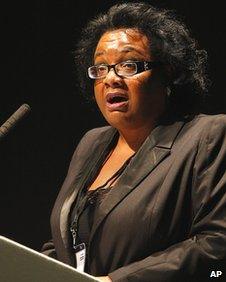Profile: Diane Abbott
- Published

Diane Abbott has frequently rebelled against the Labour leadership
Labour MP Diane Abbott is back in the news after her comments on Twitter that "white people love playing divide and rule" were criticised as racist.
The shadow public health minister said the remarks had been misinterpreted but apologised for any offence caused.
For much of her career Ms Abbott was known as something of a left-wing maverick MP who rebelled against the Blair-Brown governments numerous times on issues from a third runway for Heathrow, renewing the UK's Trident nuclear submarine system, tuition fees and the war in Iraq.
After a long career on the backbenches, she was promoted to Ed Miliband's front bench following her unsuccessful bid to become Labour leader in 2010.
When she announced her intention to run for the leadership, many at Westminster found the idea of her leading the opposition faintly surreal.
Yet Ms Abbott, a single mother and the 57-year-old MP for east London seat of Hackney North and Stoke Newington, maintained throughout that her bid was serious and that she actually wanted the job.
She argued that the leadership contest needs at least one runner who was not white and male, in recognition of the UK's diversity.
In the end, she was eliminated in the first round of voting and failed to place in elections to the shadow cabinet in October 2010. However, she was not to remain on the backbenches as Ed Miliband named her shadow minister for public health.
TV reporter
Born in London in 1953, the daughter of immigrants, Ms Abbott attended Harrow County grammar school, where she acted in a play opposite Michael Portillo, later to become a leading Conservative.
After school, Ms Abbott went on on to Newnham College, Cambridge, graduating with a history degree.
She then worked at the Home Office, followed by a stint as a civil liberties campaigner and some time as a breakfast TV reporter.
However, politics was her vocation and, at the 1987 general election - which was generally disappointing for Labour - Ms Abbott became the UK's first black woman MP.
She gradually established a reputation as left-winger, becoming more and more troublesome to the party's leadership as the New Labour project progressed.
Ms Abbott often attacked Tony Blair, repeatedly rebelling against the party whip on issues such as tuition fees, civil liberties and the Iraq war.
She was among the sterner critics of Labour's Harriet Harman for sending her children to a selective school in 1997.
At the time Ms Abbott said: "She made the Labour Party look as if we do one thing and say another."
But her outspokenness came back to haunt her in spectacular fashion.
In 2003 it was revealed that Ms Abbott, unhappy at the provision of state secondary education in Hackney, had sent her son to a private school.
Many in the Labour movement were incensed, with Ms Abbott facing accusations of hypocrisy.
Teachers' union leader Eammon O'Kane was moved to say the MP was condoning "apartheid" in education.
Recently, Ms Abbott explained: "It was a difficult decision, but that's part of bringing up a child on your own. You take difficult decisions and I expect many people who take difficult decisions for their families will empathise with my decision...
"I put being a mother ahead of being a politician."
Nomination
Despite this PR disaster, which still rankles with many on the left, Ms Abbott has continued to raise her profile.
She appeared regularly as a pundit on BBC Two's This Week, sitting alongside old school chum Michael Portillo.
This gave her a far wider public recognition than most other Labour backbenchers.
The Twitter row is not the first time her comments about race have attracted criticism.
Her comment, in defence of her decision on her son's schooling, that "West Indian mums will go to the wall for their children" led to an on-air clash with This Week presenter Andrew Neil, external, who suggested it implied "black mothers love their kids more than whites".
However Mr Neil later said he wanted her to leave her shadow ministerial post to return to the programme because she and Mr Portillo made a "perfect combination" which had since proved hard to match.
- Published5 January 2012